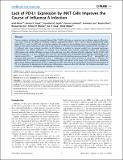| dc.contributor.author | Maazi, Hadi | |
| dc.contributor.author | Singh, Abinav K. | |
| dc.contributor.author | Speak, Anneliese O. | |
| dc.contributor.author | Lombardi, Vincent | |
| dc.contributor.author | Lam, Jonathan | |
| dc.contributor.author | Khoo, Bryant | |
| dc.contributor.author | Inn, Kyung Soo | |
| dc.contributor.author | Sharpe, Arlene Helen | |
| dc.contributor.author | Jung, Jae U. | |
| dc.contributor.author | Akbari, Omid | |
| dc.date.accessioned | 2013-10-18T14:16:03Z | |
| dc.date.issued | 2013 | |
| dc.identifier.citation | Maazi, Hadi, Abinav K. Singh, Anneliese O. Speak, Vincent Lombardi, Jonathan Lam, Bryant Khoo, Kyung Soo Inn, Arlene H. Sharpe, Jae U. Jung, and Omid Akbari. 2013. Lack of PD-L1 expression by iNKT cells improves the course of influenza A infection. PLoS ONE 8(3): e59599. | en_US |
| dc.identifier.issn | 1932-6203 | en_US |
| dc.identifier.uri | http://nrs.harvard.edu/urn-3:HUL.InstRepos:11181187 | |
| dc.description.abstract | There is evidence indicating that invariant Natural Killer T (iNKT) cells play an important role in defense against influenza A virus (IAV). However, the effect of inhibitory receptor, programmed death-1 (PD-1), and its ligands, programmed death ligand (PD-L) 1 and 2 on iNKT cells in protection against IAV remains to be elucidated. Here we investigated the effects of these co-stimulatory molecules on iNKT cells in the response to influenza. We discovered that compare to the wild type, PD-L1 deficient mice show reduced sensitivity to IAV infection as evident by reduced weight loss, decreased pulmonary inflammation and cellular infiltration. In contrast, PD-L2 deficient mice showed augmented weight loss, pulmonary inflammation and cellular infiltration compare to the wild type mice after influenza infection. Adoptive transfer of iNKT cells from wild type, PD-L1 or PD-L2 deficient mice into iNKT cell deficient mice recapitulated these findings. Interestingly, in our transfer system PD-L1−/−-derived iNKT cells produced high levels of interferon-gamma whereas PD-L2−/−-derived iNKT cells produced high amounts of interleukin-4 and 13 suggesting a role for these cytokines in sensitivity to influenza. We identified that PD-L1 negatively regulates the frequency of iNKT cell subsets in the lungs of IAV infected mice. Altogether, these results demonstrate that lack of PD-L1 expression by iNKT cells reduces the sensitivity to IAV and that the presence of PD-L2 is important for dampening the deleterious inflammatory responses after IAV infection. Our findings potentially have clinical implications for developing new therapies for influenza. | en_US |
| dc.language.iso | en_US | en_US |
| dc.publisher | Public Library of Science | en_US |
| dc.relation.isversionof | doi:10.1371/journal.pone.0059599 | en_US |
| dc.relation.hasversion | http://www.ncbi.nlm.nih.gov/pmc/articles/PMC3598698/pdf/ | en_US |
| dash.license | LAA | |
| dc.subject | Biology | en_US |
| dc.subject | Immunology | en_US |
| dc.subject | Immune Cells | en_US |
| dc.subject | Antigen-Presenting Cells | en_US |
| dc.subject | T Cells | en_US |
| dc.subject | Immunity | en_US |
| dc.subject | Immunity to Infections | en_US |
| dc.subject | Model Organisms | en_US |
| dc.subject | Animal Models | en_US |
| dc.subject | Mouse | en_US |
| dc.subject | Medicine | en_US |
| dc.subject | Infectious Diseases | en_US |
| dc.subject | Viral Diseases | en_US |
| dc.subject | Influenza | en_US |
| dc.title | Lack of PD-L1 Expression by iNKT Cells Improves the Course of Influenza A Infection | en_US |
| dc.type | Journal Article | en_US |
| dc.description.version | Version of Record | en_US |
| dc.relation.journal | PLoS ONE | en_US |
| dash.depositing.author | Sharpe, Arlene Helen | |
| dc.date.available | 2013-10-18T14:16:03Z | |
| dc.identifier.doi | 10.1371/journal.pone.0059599 | * |
| dash.contributor.affiliated | Sharpe, Arlene | |


